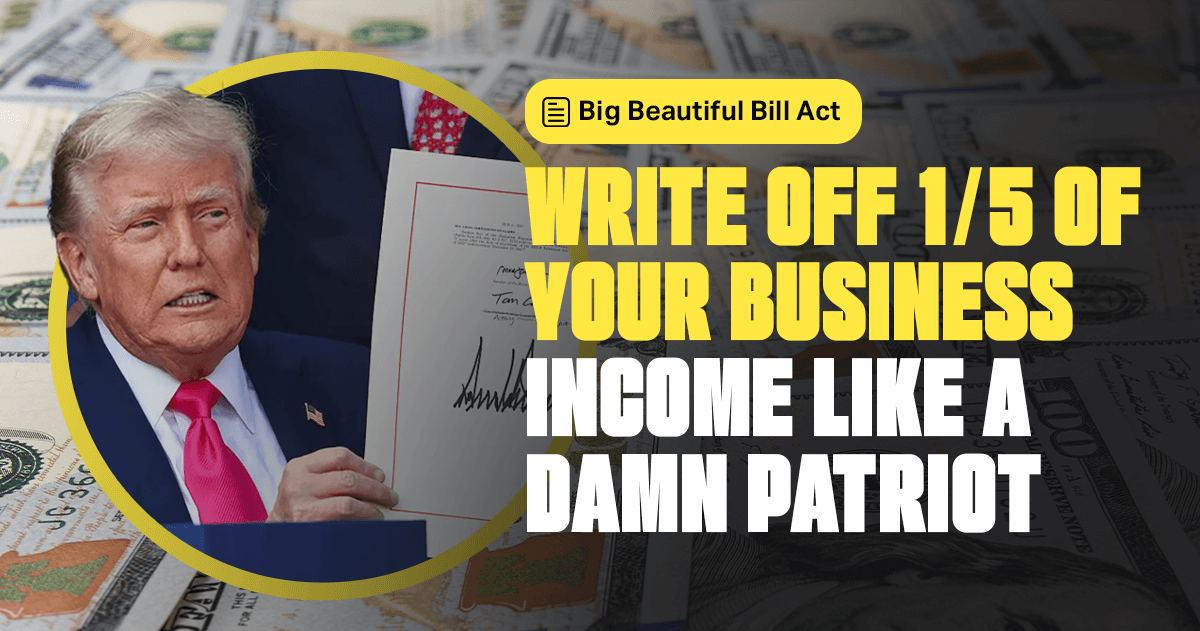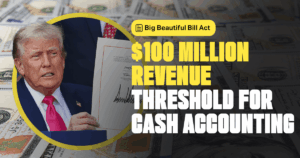Here’s something that’ll make you want to kiss Uncle Sam on the mouth: If you own a business, you can now deduct 23% of your income just for being an entrepreneur.
I’ll never forget the day my accountant first explained the pass-through deduction to me. This was back in 2018, when they created this beautiful piece of legislation that let business owners deduct 20% of their qualified business income. I’m sitting there with my usual shoebox of receipts, and he starts talking about this magical deduction.
“Andrew, you made $200,000 last year from your business. You can deduct $40,000 of that just for being a pass-through entity.”
I said, “That sounds illegal.”
“It’s not just legal, Congress wrote it specifically to reward people like you for taking the risk of starting a business.”
“People like me?”
“Yeah, people who create jobs, take risks, and drive the economy instead of sitting in a cubicle waiting for someone else to sign their paycheck.”
I didn’t grow up on the right side of money, so when the government hands me a $40,000 deduction just for being an entrepreneur, I’m not going to argue with the logic. I’m just going to take it and say thank you.
And here’s the beautiful part—Trump’s Big Beautiful Bill just made this deduction permanent AND increased it to 23%. That means if you’re structured as an LLC, S-Corp, sole proprietorship, or partnership, you can deduct nearly a quarter of your business income just for having the balls to work for yourself.
But let’s be honest—most business owners are either completely clueless about this deduction or they’re so confused by the rules that they’re not claiming it properly. So let me break this down like you’re my neighbor, not some MBA who speaks in acronyms.
The pass-through deduction applies to “qualified business income” from pass-through entities. That’s basically any business where the profits flow through to your personal tax return instead of being taxed at the corporate level. Think LLCs, S-Corps, sole proprietorships, partnerships—the kinds of businesses that actual entrepreneurs run.
You take your qualified business income, multiply it by 23%, and boom—that’s your deduction. Make $100,000? Deduct $23,000. Make $500,000? Deduct $115,000.
It’s like the government is paying you to be successful.
But—and there’s always a but—there are limitations for high earners and certain types of businesses. If you make too much money or you’re in what they call a “specified service trade or business” (like law, accounting, consulting, or healthcare), the rules get more complicated. Because apparently, the government thinks some entrepreneurs are more deserving than others.
How many of you have been busting your ass running a business, paying taxes on every dollar you make, without knowing that Uncle Sam owes you a 23% discount just for being an entrepreneur?
You see what I mean? This isn’t just about saving money on taxes—this is about the government finally recognizing that the people who create jobs and take risks deserve a break.
Think of it like this: You’re competing against big corporations that have armies of accountants and access to tax strategies you’ve never heard of. The pass-through deduction is Congress saying, “You know what? Let’s level the playing field a little bit. Small business owners shouldn’t pay the same effective tax rate as Walmart.”
The math ain’t mathin’ if you’re structured as a pass-through entity and not claiming every penny of this deduction.
But here’s what separates the smart money from everyone else—they understand this deduction is more than just a tax break. It’s validation. It’s the government saying that entrepreneurs matter, that risk-takers deserve rewards, that the people who create economic growth shouldn’t be penalized for their success.
My buddy runs a small manufacturing company. Last year, he made $300,000 in qualified business income. With the 23% deduction, he just saved about $25,000 in taxes. That’s real money—money he can reinvest in equipment, hire another employee, or just keep as a reward for all the sleepless nights he spent building his business.
This isn’t just about money, though. This is about recognizing that entrepreneurs are the backbone of American prosperity.
When you make it easier for business owners to keep more of what they earn, they don’t stuff it under their mattresses. They reinvest it. They grow. They hire people. They drive the economy forward.
I’m not doing this for applause, but I’ve seen too many good people grind themselves into the ground building businesses, only to hand half their profits to Uncle Sam because they didn’t understand the rules. They think the tax code is written against them when sometimes—just sometimes—it’s actually on their side.
Money is a game, and the pass-through deduction is one of the best pieces you can have on the board.
You create income through your business, you structure it properly, you claim every deduction you’re entitled to, and you multiply what matters most—your financial freedom, your ability to grow, and your reward for taking risks that employees never take.
So here’s my challenge: Stop thinking like someone who’s grateful for whatever’s left after the government takes their cut. Start thinking like someone who understands that when Congress writes tax breaks specifically for entrepreneurs, it’s because entrepreneurs drive this economy.
The shoebox mentality says “pay whatever taxes they tell you and hope for the best.” The pass-through deduction mentality says “claim every benefit you’ve earned for having the courage to work for yourself.”
Which entrepreneur are you going to be?





